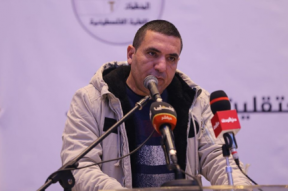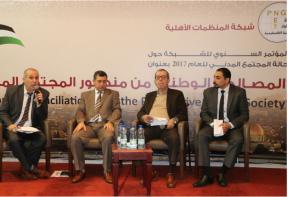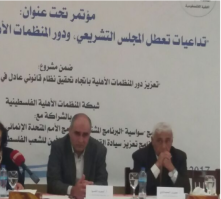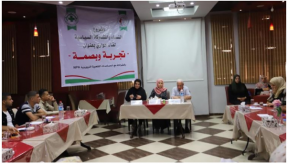PNGO’s Ties to Palestinian Terror Groups
Introduction
The Palestinian NGO Network (PNGO) is an umbrella organization of 142 Palestinian non-governmental organizations (NGOs) working to “coordinate” the work of its member NGOs in five main sectors, “health, democracy and human rights, women and children, rehabilitation and agriculture.”
NGO Monitor research shows that multiple PNGO officials have ties to terrorist organizations, and at least five PNGO members have ties to EU-designated terror organizations, including through their employees and/or board members who are directly involved in activities and programs. PNGO also regularly hosts and/or participates in events with officials from Palestinian terror groups, including Hamas and Popular Front for the Liberation of Palestine (PFLP). Additionally, PNGO consistently rejects government donor mandated anti-terror requirements (see below).
Lack of Funding Transparency
PNGO does not publish financial information, reflecting a lack of transparency.
PNGO participates in “Partnership for democratic development in Palestine,” a project (2016-2019) of Norwegian People’s Aid (NPA). The project, funded by Norway (NOK 50.8 million), is implemented along with 10 other partners including Union of Agricultural Work Committees (UAWC), Palestinian Center for Democracy and Conflict Resolution (PCDCR), and Democracy and Workers’ Rights Center [Association] in Palestine (DWRC).
PNGO is also a co-grantee of a €446,482 EU (2016-2019) project titled “Contributing to the respect, protection and promotion of the right to association in the Gaza Strip.” PNGO received an additional €261,914 from the EU in 2017-2020.
PNGO does not list its board members. It appears that this information appeared previously on PNGO’s website but has been removed.
PNGO’s Ties to Palestinian Terror Groups
PNGO regularly hosts events, including at its headquarters, with representatives from Palestinian terror groups, such as Hamas and the PFLP. Its officials have also spoken on panels alongside terror group members. For example:
- On December 22, 2019, PNGO, Al-Dameer, and the Independent Commission for Human Rights (ICHR) organized a conference on “international accountability mechanisms,” featuring a speech by PFLP Prisoners Committee official ‘Alam Ka’abi. Ka’abi was sentenced to nine life sentences in 2004 for his role in recruiting and sending terrorists to a number of attacks in the early 2000s, resulting in the deaths of several Israeli citizens and injuring dozens.1

PFLP Prisoners Committee Official Ka’abi speaking in front of the PNGO logo
- On December 20, 2017, PNGO organized a conference on “Palestinian reconciliation.” PFLP official Rabah Muhana was a guest speaker. Mahana is referred to on the PFLP’s official website as a “Member of the Front’s political bureau and one of the most prominent national leaders in the Gaza strip…he was known for his adherence to national principles, the right of return and resistance.” Mahana joined the PFLP in 1979 and was arrested by Israel multiple times, one of them in 2001 in the wake of the assassination of Israeli Minister of Tourism Rehavam Zeevi, carried out by the PFLP.

PFLP Official Mahana (second from the right) under the PNGO logo (top right corner).
- In November 2017, PNGO participated in a joint press conference with representatives from “the five Palestinian democratic powers,” including the PFLP PNGO and the groups released a joint statement about a Palestinian unity government.
- On January 10, 2017, Jameel Majdalawi, member of the PFLP Political Bureau in Gaza, spoke at a conference “Palestinian divide.” The conference was organized by PNGO and the Sawasya program, a joint UNDP and UN Women framework. The head of PNGO,2 Amjad Al-Shawa, also spoke at the event.

PFLP Political Bureau Member Majdalawi and Head of PNGO Shawa sitting under the PNGO logo (far right corner).
- In March 2015 at NGO Headquarters, PNGO officials hosted a delegation of PFLP and Hamas representatives, organized by the Prisoners Committee. The visit’s goals included the “strengthening of relations between PNGO and the Prisoners Committee.” Participants included Hamas’ Coordinator of the Prisoners Committee Abu Khamis Dababash and Secretary of the Prisoners Committee and representative of the PFLP ‘Attia al-Bassiouni.
- In October 2014, PNGO co-organized a conference with the PFLP’s “Preparatory Committee” and the National Initiative Movement. One of the speakers at the event was the PFLP’s Jameel Mazhar, who “called… for escalating the mass popular resistance against the Zionist occupation, foremost of which is armed resistance, as the most effective way to confront the occupation.” PNGO’s former director Mohsen Abu Ramadan also spoke at the event, adding “it is necessary to leave the negotiations [with Israel] and take the decisions of war and peace collectively.”
PNGO Officials with Ties to Palestinian Terror Groups
Shatha Odeh: PNGO’s head of the board3 and head of PNGO’s Coordinating Committee.4 Odeh also serves as CEO of HWC,5 an organization with ties to the PFLP (see NGO Monitor’s report).
- On January 2020, in response to EU anti-terror legislation regarding funding contracts with NGOs, Odeh stated, “We disagree with the European Union on the list… which includes seven political organizations and classifies them as “terrorists”. For us, they are national liberation movements.” Odeh also stated: “the new conditions are interpreted as political pressure from the Israeli side.”
Mohsen Abu Ramadan: PNGO’s former director in Gaza and former member of PNGO’s General Assembly. Abu Ramandan continues to write articles on PNGO’s website, including as recently as May 2020. Abu Ramadan is a member of the Palestinian Democratic Assembly, an organization that unites the PFLP and the DFLP terror groups under one umbrella. Abu Ramadan is also referred to as “member of the coordination committee for the right of return marches.”
- On January 2020, in response to EU anti-terror legislation regarding funding contracts with NGOs, Abu Ramadan stated, “There are many factions on the list of terrorism, including Hamas, Islamic Jihad, and perhaps the Popular and Democratic Fronts, and some of the organizations affiliated with the factions. We… refuse to distinguish on this classification, we consider all the Palestinian people a victim of the occupation, we consider that the right Resistance is legitimate, and we reject stigmatizing the resistance with terrorism in any way.”
- On April 3, 2019, Abu Ramadan participated and spoke at an event commemorating PFLP’s Ghassan Kanafani alongside PFLP member Kaid Al-Ghul.
- On March 14, 2018, Abu Ramadan was a guest speaker at an event organized by the PFLP in commemoration of a PFLP militia fighter who died in the 70s, Abd Al-Halim Al-Ghul. Other speakers at the event included prominent PFLP leaders, such as Jameel Majdalawi, described as speaker on behalf of the PFLP and Member of the Legislative Council on behalf of the [PFLP] Shahid Abu Ali Mustafa block.
- On October 28, 2018, Abu Ramadan participated and spoke at a demonstration organized by the “five democratic forces,” including the PFLP and DFLP terror groups, alongside the PFLP’s Jameel Mazhar.
- On November 9, 2017, participated and spoke at a demonstration of the “five democratic forces” alongside the PFLP’s Maryam Abu Daqqah.
Walid Hanatsheh (Abu Ras) is listed as a PNGO board member on behalf of a PFLP-linked NGO, Health Work Committees (HWC), and is the HWC finance and administration manager.
- Hanatsheh was arrested in October 2019, alleged to be the leader of PFLP “military” operations in the West Bank.
- According to a December 12, 2019 indictment in Israeli military court, he commanded Samer Arbid, who has been charged for leading the PFLP terror cell that carried out an August 2019 bombing attack that murdered 17-year-old Rina Shnerb, and injured her father and brother (on file with NGO Monitor).
- According to an Israeli media report, Hanatsheh bankrolled the bombing.
PNGO describes Ashraf Abu Aram as “a human rights defender and advocacy officer of Palestinian NGO Network (PNGO).” According to a November 2019 statement by PNGO, Abu Aram was arrested by the Israeli security forces (November 7, 2019) and “was transferred under ‘administrative detention for four months.’”
A 2012 report in Haaretz identified Abu Aram as a PFLP member who was arrested for “allegedly planning to kidnap an IDF soldier in order to bring about the release of PFLP leader Ahmed Sa’adat from an Israeli jail.” According to the Israel Security Agency (Shabak), “Abu Aram already contacted a local weapons dealer in an effort to obtain two pistols and an automatic rifle with which to carry out the planned abduction.”
PNGO Events with Its Terror-Tied NGO Members and Terror-Tied Officials
At least five PNGO member organizations have ties to the PFLP, including Addameer, DCI-P, UHWC, UAWC, and UPWC. PNGO regularly promotes articles and activities of its terror-tied NGO members. For example:
- On September 30, 2019, PNGO published a statement by one of its NGO members, Addameer, condemning the arrest of PFLP members Samer Arbid and Khalida Jarrar. In 2019, Arbid was arrested and charged with leading a PFLP terror cell that murdered a 17-year old Israeli girl in August 2019. Jarrar was arrested on October 31, 2019 on suspicions of “involvement in terror activity.” On December 18, 2019, it was revealed that Jarrar has “emerged as the head of the PFLP in the West Bank and responsible for all the organization’s activities.”
- On September 19, 2019, PNGO published an article about its member organization the Union of Palestinian Women’s Committee (UPWC), identified by Fatah as an official “affiliate” and by USAID as the “women’s organization” of the PFLP. The article notes that UPWC organized a conference where the PFLP’s Kaid Al-Ghul spoke about “his experience in political work since joining the Arab nationalist movement in 1967 when he was 17 years old, during which he was active in the vanguard of popular resistance.” The conference took place in cooperation with Norwegian People’s Aid (NPA).

- On March 18, 2018, PNGO published an article about a UPWC conference in cooperation with NPA, featuring Mariam Abu Daqqah, a member of the PFLP’s Political Bureau. In her speech, Abu Daqqah glorified armed resistance and terrorism, noting, “There was an important role for women in the Popular Front and the left in general… the rules of procedure do not differentiate between them and their male counterparts regarding the missions: the stage of armed struggle… and the hijacking of aircraft.”
- On July 10, 2017, PNGO published an article noting that UAWC organized an event in solidarity with the PFLP’s Khalida Jarrar (see above) and with UPWC’s chair Khitam Sa’afeen, arrested by Israel that same year for suspicions of involvement in terrorist activities. PNGO also featured an article by the International Commission to Support Palestinians’ Rights, which denounced the arrest of Jarrar and Sa’afeen and sympathized with released prisoner Ihab Mas’oud, charged of detonating a booby-trapped car in Jerusalem in 2001.
- On October 9, 2017, PNGO published an article noting that PFLP member Jameel Mazhar spoke at a conference organized by the Masarat center, alongside Hamas political bureau member, Khaleel Al-Hiyyah, and prominent leader in the Palestinian Islamic Jihad Ahmed Al-‘Awri.
- On November 20, 2017, PNGO published an article about a conference organized by its NGO members the Culture and Free thought Association and the Media Assembly Association. PFLP’s Hani Al-Thawabteh and Palestinian Islamic Jihad’s Ahmad Al-Mudallal participated in the conference.
- On September 8, 2016, PNGO published an article noting that Addameer held a round table meeting in which the PFLP’s Taghreed Jum’ participated.
Rejection of Anti-Terror Legislation Related to Funding
- In 2019, the EU introduced a requirement in its contracts with NGOs, under “General conditions applicable to European Union-financed grant contracts for external actions” (Annex G.2, Annex II, Article 1.5 bis). It stipulates that “Grant beneficiaries and contractors must ensure that there is no detection of subcontractors, natural persons, including participants to workshops and/or trainings and recipients of financial support to third parties, in the lists of EU restrictive measures.”6
- According to media reports, during a December 20, 2019 meeting with EU officials, representatives from PNGO “refused to sign an EU grant request which stipulates among its criteria that beneficiaries must refuse to transfer any EU aid given to terrorist groups or entities….The organizations in question steadfastly decline to do so, claiming Palestinian terrorist groups are merely ‘political parties.’”
- On December 30, 2019, multiple Palestinian NGOs, including PNGO members, launched a “Palestinian National Campaign to Reject Conditional Funding.” The campaign, which rejects the EC’s “conditioned funding” and “so-called anti-terrorism clauses and policies…on preventing terrorism that affect the history and struggle of our people” (emphasis added), justifies the use of violence and claims that the “Palestinian resistance factions are not terrorist organizations,” (see video clip).
- This is not the first incidence that PNGO rejected anti-terror measures related to donor requirements. For example, in June 2017, PNGO condemned Norway for pulling funding from a youth center named after Dalal Mughrabi, a terrorist who in 1978 murdered 37 civilians, including 12 children. PNGO referred to Mughrabi as a “Palestinian Woman Freedom Fighter,” stating that “PNGO believes this is another form of foreign domination and oppression calling Palestinian resistance a terrorist resistance against Israeli occupation…PNGO stands strong against conditional funding, especially when it threatens Palestinian right to resist foreign domination, exploitation, oppression and occupation” and that “there is a difference between freedom fighters and terrorists” (emphasis added).
- Similarly, in April 2017, PNGO called on the international community not to “use aid to undermine legitimate Palestinian resistance.” According to PNGO, “We reject all de-legitimization or criminalization of lawful Palestinian resistance, whether in form of allegations of terrorism, anti-semitism or otherwise… We call on all governments and aid providers to respect our right to lawful resistance, support Palestinian human rights defenders, and ensure equal, impartial and transparent access to funding for all.”
- In 2007, PNGO played a leading role in a Palestinian boycott of USAID funding, following US government demands that NGO grantees sign anti-terrorism clauses as part of their funding agreements. As part of this campaign, PNGO wrote that the anti-terror clause “ignores the legal Palestinians’ right of resistance against the Israeli occupation.” An unnamed PNGO official also commented, “They are telling us what to do and they interfere in internal politics,” describing the US list of terror groups as an attempt to “create internal conflict among Palestinians.” According to a 2013 study commissioned by the UN, PNGO “stated that its members would not sign funding agreements that included the ATC [Anti-Terror Certificate]: this is now a condition for membership under PNGO byelaws [sic]” (emphasis added).
Footnotes
- Ka’abi was released in a prisoner exchange in 2011.
- According to PNGO’s English and Arabic websites, as of April 2020.
- According to Arabic language media, of January 25, 2020.
- According to Arabic language media, as of October 28, 2018.
- According to Arabic language media, as of May 1, 2020.
- In the Palestinian context, these lists EU-designated terrorist organizations (e.g. Hamas, Izzedine al-Qassam Brigades, Al-Aqsa Martyrs Brigade, Islamic Jihad, and the Popular Front for the Liberation of Palestine).




